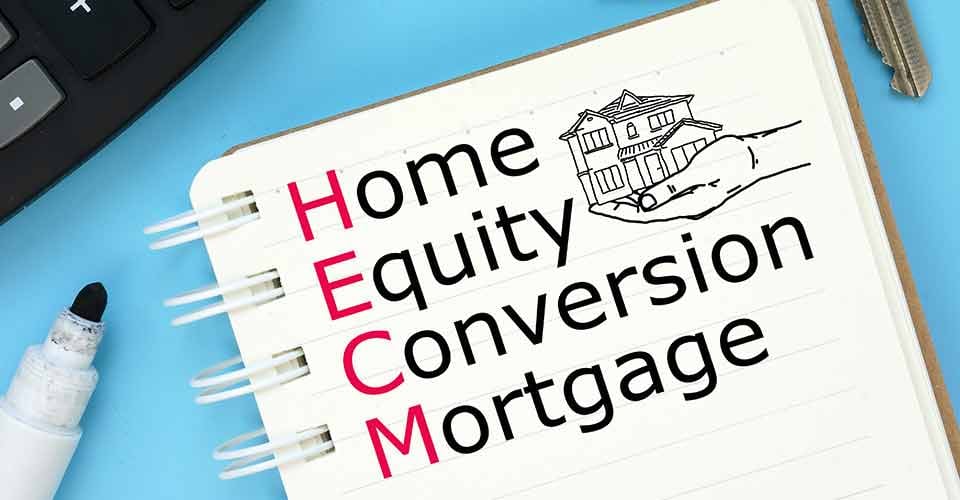Home Equity Conversion Mortgage (HECM): Benefits and Requirements
A federally insured reverse mortgage, known as a home equity conversion mortgage (HECM), enables homeowners to use their home as collateral to receive monthly cash payments from their equity. The U.S. Department of Housing and Urban Development (HUD) backs HECMs, and the received cash is usually tax-free, with no restrictions on its usage.
Key Information
-
Reverse mortgages are loans that allow homeowners to convert their home equity into cash without selling their home.
-
Home equity conversion mortgages (HECMs) are a type of reverse mortgage that is insured by the Federal Housing Administration (FHA).
-
HECMs make up the majority of the reverse mortgage market and typically offer better terms than proprietary reverse mortgages.
- However, the maximum loan amount for HECMs is limited, and mortgage insurance premiums are required.
How does a HECM work?
Home equity conversion mortgages, which account for the majority of reverse mortgages, differ from privately sponsored reverse mortgages in that they typically offer lower interest rates for borrowers.
However, privately sponsored reverse mortgages may allow for higher borrowing amounts and lower costs than HECMs, but the economics of each option depend on factors such as the borrower's age and expected length of ownership.
Most reverse mortgages, including HECMs, are aimed at seniors and do not require repayment until the borrower sells their home or passes away.
When comparing a HECM to a home equity loan, there are similarities in that both allow borrowers to receive a cash advance based on the equity of their home, which serves as collateral.
However, home equity loans typically require the borrower to make monthly interest payments soon after receiving the funds, whereas a reverse mortgage does not require repayment until the home is sold or the borrower dies.
Although HECM loans do not mandate monthly payments from borrowers, they do come with expenses such as closing and servicing fees, as well as mortgage insurance premiums.
While borrowers have the option to include these fees and premiums in the loan, doing so reduces the net principal limit available for them to utilize from their equity.
What is the difference between a HECM and a reverse mortgage?
While HECMs are considered a type of reverse mortgage, they differ in significant ways from other types of reverse mortgages available.
One significant difference is that HECMs are insured by the Department of Housing and Urban Development (HUD), and they must adhere to regulations set by the Federal Housing Administration (FHA).
This is not the case with privately sponsored reverse mortgages, which are referred to as proprietary reverse mortgages.
The FHA regulates HECMs to protect both lenders and borrowers. The regulations include limits on loan amounts, requirements for mortgage insurance premiums, and rules around counseling for borrowers.
These regulations provide borrowers with additional consumer protections that are not available with other types of reverse mortgages.
In contrast, proprietary reverse mortgages, which are sponsored by private lenders, are not subject to the same FHA regulations. They offer more flexibility in terms of loan amounts and interest rates but may have higher fees and fewer consumer protections than HECMs.
What is a HECM purchase?
A Home Equity Conversion Mortgage (HECM) for Purchase is a unique financing option for seniors looking to purchase a new primary residence.
It allows seniors aged 62 or older to use the equity in their current home to buy a new home without having to make monthly mortgage payments.
With a HECM purchase, the borrower can use the proceeds from the HECM loan to purchase a new home and live in it as their primary residence. This differs from a traditional reverse mortgage, which is typically used to convert home equity into cash.
The borrower is required to make a down payment on the new home, which is typically between 30% and 50% of the purchase price, depending on their age and the amount of the loan. The remainder of the purchase price is covered by the HECM loan.
One advantage of using a HECM for Purchase is that the borrower can typically purchase a more expensive home than they would be able to afford otherwise.
Additionally, since the borrower does not need to make monthly mortgage payments, they may have more cash flow available to cover other living expenses.
When it comes to repaying the HECM loan, the borrower has several options. They can choose to repay the loan with a lump sum payment, refinance the HECM loan, or select a flexible repayment option.
The flexible repayment option allows the borrower to make partial payments on the loan, which can help reduce the overall balance and interest charges.

Who is eligible for a HECM?
Eligibility for a HECM loan is determined by a combination of borrower and property requirements. Below is a breakdown of the eligibility criteria for a HECM loan:
Borrower eligibility
To be eligible for a HECM loan, borrowers must meet the following requirements:
-
Be 62 years of age or older - Only seniors who are at least 62 years old are eligible for a HECM loan.
-
Have significant equity in your home - The borrower must have a significant amount of equity in their current home.
-
Use the home as your principal residence - The property that the borrower is using as collateral for the HECM loan must be their primary residence.
-
Not be delinquent on any federal debt - Borrowers must not have any delinquent federal debt, such as taxes or student loans.
-
Be able to cover property taxes, insurance, homeowner association fees and other potential charges, for the ongoing future - Borrowers must demonstrate the ability to pay for ongoing property-related expenses such as property taxes, insurance, and homeowner association fees.
- Attend a session with a HUD-approved HECM counselor - Borrowers must attend a session with a HUD-approved HECM counselor who will explain the loan's terms and requirements.
Property eligibility
In addition to the borrower requirements, the property that is being used as collateral for the HECM loan must also meet certain eligibility criteria. The following property types are eligible for a HECM loan:
-
A single-family home or a multifamily property occupied by the borrower. The property can be a single-family home or a multi-unit property, as long as the borrower occupies one of the units.
-
An FHA single-unit-approved individual condominium or a unit in a HUD-approved condominium development. The property can be an individual condominium unit that is approved by the Federal Housing Administration (FHA) or a unit in a condominium development that is approved by the Department of Housing and Urban Development (HUD).
- A manufactured home that meets FHA requirements. The property can be a manufactured home that meets the FHA's requirements for manufactured homes.
Both the borrower and the property must meet the eligibility criteria in order to qualify for a HECM loan.
Who shouldn’t take out a reverse mortgage?
While a reverse mortgage can be a valuable tool for some homeowners, it's not the right solution for everyone. Here are some factors to consider if you're thinking about whether a reverse mortgage is right for you:
-
If you only want to borrow a small amount - Reverse mortgages can come with significant fees, so if you only need a small amount of money, a reverse mortgage may not be worth the costs. In this case, it may be better to explore other borrowing options, such as a personal loan or a home equity line of credit.
-
If you don't meet the age requirement - Reverse mortgages are only available to homeowners who are 62 years of age or older. If you're not yet 62, you won't be eligible for a reverse mortgage.
-
If you plan to stay in your home for only a short amount of time - Reverse mortgages are designed for homeowners who plan to stay in their homes for the long term. If you're planning to sell your home in the near future, a reverse mortgage may not be the right choice for you.
- If you can't afford to maintain your home - One of the requirements of a reverse mortgage is that you continue to maintain your home, including paying property taxes, homeowners insurance, and home repairs. If you can't afford to maintain your home, a reverse mortgage may not be the right choice for you.
Advantages of HECM loans
One of the most significant benefits of a HECM loan is that you can receive a steady stream of income without having to move out of your home. This income is also tax-free and won’t affect your Social Security or Medicare benefits.
Additionally, with a HECM loan, you can borrow larger loan advances, making it possible to cover large expenses such as healthcare costs, home renovations or other significant expenses.
HECM loans are also less expensive than private loans since the total loan costs are usually lower than proprietary loan costs.
This is because HECM loans are insured by the Federal Housing Administration and have standardized fees that protect the borrower.
Disadvantages of HECM loans
One of the main drawbacks of HECM loans is that you or your heirs could lose the home if the loan isn’t repaid.
This is because the loan is secured by the equity in your home, and if the loan balance grows to exceed the value of your home, you may have to sell your home to repay the loan.
Upfront costs for HECM loans can also be high, including loan origination fees, appraisal fees, and other closing costs. Additionally, servicing fees and mortgage insurance premiums are charged over the life of the loan, increasing the total cost of borrowing.
Another disadvantage of HECM loans is that the interest fees grow as you borrow more, which can significantly reduce the equity in your home over time. Moreover, the interest on a HECM loan is not tax-deductible until you pay off the loan, unlike traditional mortgages.
Lastly, most HECM loans have variable interest rates, which means your interest rate can go up, increasing your borrowing costs over time.
How can you repay a HECM?
The borrower is responsible for paying back the full balance of a reverse mortgage when the home is no longer their primary residence. This can occur when the borrower passes away, sells the home, or permanently moves out.
In addition, failure to make necessary property tax and insurance payments or to maintain the home may also result in repayment obligations.
To satisfy the repayment obligation of a HECM loan, several options are available. The borrower can sell the home, refinance the reverse mortgage into another reverse mortgage or a conventional loan, or liquidate assets to pay off the loan balance.
Regardless of the method of repayment, the borrower has legal protections to ensure that the amount owed never exceeds the home's appraised value.
Getting out of a reverse mortgage may have implications for the borrower or their heirs, depending on the repayment method chosen.
Therefore, careful consideration should be given to the decision to take out a reverse mortgage, and consultation with a financial advisor or HUD-approved HECM counselor is recommended.
Bottom Line
In summary, the HECM is the most popular form of reverse mortgage. It offers older borrowers the option to access their home equity without having to pay it back until they pass away or move.
If borrowers don't require a higher loan amount than what's available through HUD limits for a private reverse mortgage, and they don't qualify for a single-purpose reverse mortgage through a nonprofit or government organization, then the HECM is the best option.
With over 50 years of mortgage industry experience, we are here to help you achieve the American dream of owning a home. We strive to provide the best education before, during, and after you buy a home. Our advice is based on experience with Phil Ganz and Team closing over One billion dollars and helping countless families.

About Author - Phil Ganz
Phil Ganz has over 20+ years of experience in the residential financing space. With over a billion dollars of funded loans, Phil helps homebuyers configure the perfect mortgage plan. Whether it's your first home, a complex multiple-property purchase, or anything in between, Phil has the experience to help you achieve your goals.


 By
By  Edited by
Edited by 






